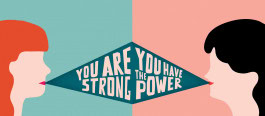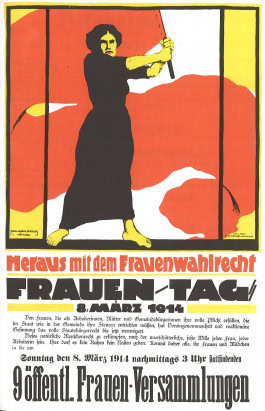
German women's rights activist Clara Zetkin first suggested the idea for International Women's Day in 1910 at the Conference of Socialist Women— held that year in Copenhagen. A year later, Germany celebrated Women's Day for the first time on March 19th. Demonstrations demanding women's right to vote — a right that was finally handed to German women in 1918 — dominated the day.
In the German postwar era, March 8th was largely rejected by the former West Germany, which found it too ideologically conflicting because of its next-door neighbors. But across the border in the GDR, Women's Day was very important. The public holiday in East Germany aimed to promote equality and appreciate the work of women, who were often handed red roses.
It wasn't until the 1970s that women in West Germany began make their voices heard on March 8th. Hard to believe it, but it was only in 1977 that women in West Germany were entitled to gainful employment without the consent of their husbands.
In 1975, the United Nations officially recognized the date as the International Women’s Day, and this day in our times is a global celebration of social, economic, cultural, and political achievements of women. The day also marks a call to action for accelerating women's equality. Every year IWD is given a theme. This year’s theme is #choosetochallenge, explained that “a challenged world is an alert world and from challenge comes change,” calling to action to celebrate a gender-equal world.

Photo: The Prussian Heritage Image Archive. Poster for Women's Day, March 8, 1914
Throughout German history, women have been voicing this challenge and here’s our celebratory ode to remember and get inspired by just a few:
Author Louise Otto-Peters (1819-1895) is a pioneer of Germany's women's movement. She called for more female participation in a decision-making and co-founded the General German Women's Association (Allgemeiner Deutscher Frauenverein) in 1865, when she was only 24. The activist also wrote poetry and novels, earning her the "songbird" nickname.
The women's movement at the end of the 19th century aimed to emancipate girls and women through schooling. Teacher and feminist Helene Lange (1848-1930) was a leading figure in this movement; she also founded different women's suffrage groups.
Gabriele Münter (1887-1962), a German expressionist painter, doesn’t come directly to mind when talking about the feminist movement, but she was an integral part of the process. Münter and her then partner, Kandinsky, were prominent leaders in the German avantgarde movement. Her contributions, though not as widely known as some of her contemporaries, remain relevant and inspiring.
Hannah Arendt (1906-1975) was a prominent political theoretician who was German born but eventually escaped to the USA during the Holocaust. Her works largely dissected and evaluated power, paying specific attention to totalitarianism, authority, and democracy. Hannah Arendt was truly a woman with an powerful voice and forward-looking perspective.
In 1977, a pioneer of Germany's feminist movement, Alice Schwarzer (born 1942) founded the country's first feminist magazine EMMA, which avoided the usual glitzy glamour and tackled political issues. She is still at the forefront of the movement and prioritizes economic self-sufficiency in women and constantly speaks out against outdated anti-feminist laws from the 70s that remained in the country today. Even though Schwarzer is a controversial figure, she has driven important debates that led to necessary reforms.
We applaud to all the women who made this day relevant and celebrate every femme of the world today and every day!
Related Articles: